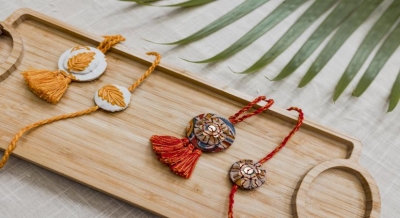By Siddhi Jain
New Delhi– As sustainability increasingly drives both demand and supply in the market, brands are experimenting with no-waste, authentic and eco-friendly products for festivals like Ganesh Chaturthi and Holi. This year, there seems to be a conscious shift towards sustainable Rakshabandhan bands as well, some of which also contain seeds that can be planted after use.
Sajke, a Vadodara-based sustainable brand that makes handcrafted, contemporary outfits with zero waste products, has mustard seeds in it. The brand has also come up with a plant-growing kit, containing rakhis, which helps you grow a spinach plant within days. It consists of a biodegradable pot, spinach seeds, coir for mud and an organic fertiliser. The ‘Vedic rakhi’ also has elements of turmeric, sandalwood and saffron.
Divya Advani, owner and founder of Sajke, tells IANSlife: “The aware consumer wants to be a part of change, he or she wants to contribute in the reduction of carbon footprints and hence his/her decision making process impacts his/her gifting choices too. Sustainability with a hint of our culture is the reason people opt for it! They feel connected to their roots and are also being sustainable at the same time.”
According to Vinay Kothari, Founder at Go Desi, a popular homegrown packaged food brand inspired by Indian flavors and formats, the modern consumer is adapting to a new reality.
“Easy access to the internet, especially social media platforms, has also led to an increased awareness around climate change and other environmental issues. These inputs are shaping daily lives of consumers, thus making them more careful with their purchase decisions. Today, sustainability is definitely a big part of their value system, which is reflected in their buying patterns.
“Not only that, Indian consumers want to stay rooted to their culture and traditions. So they want something that gives them a mix of both – sustainability and that desi touch. In this, opting for sustainable gifts and rakhi finds traction much easily.” (IANS)














